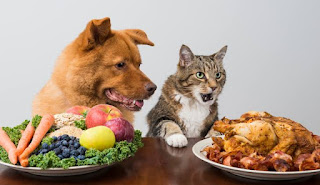Pet's Nutritional Needs
Introduction:
When it comes to keeping our beloved pets healthy and happy, providing proper nutrition is key. Just like humans, pets require a balanced diet to thrive and maintain optimal health. In this article, we'll explore the nutritional needs of common household pets, including dogs, cats, rabbits, and birds, and offer practical tips for ensuring they receive the nutrients they need to lead vibrant lives.Pet Nutrition:
Before diving into specific dietary recommendations for different types of pets, it's essential to understand the basic building blocks of pet nutrition. Like humans, pets require a balanced combination of proteins, carbohydrates, fats, vitamins, and minerals to support their overall health and well-being.Proteins: Proteins are essential for building and repairing tissues, supporting immune function, and maintaining healthy skin and coat. Good sources of protein for pets include meat, poultry, fish, eggs, and dairy products.
Carbohydrates: Carbohydrates provide a readily available source of energy for pets. While some carbohydrates are necessary, it's important to choose high-quality sources such as whole grains, fruits, and vegetables, and to avoid excessive amounts of simple sugars and refined grains.
Fats: Fats are a concentrated source of energy and play a vital role in nutrient absorption, hormone production, and cell membrane function. Healthy fats can be found in sources like fish oil, flaxseed oil, and animal fats, but it's crucial to monitor fat intake to prevent obesity.
Vitamins and Minerals: Vitamins and minerals are essential for various metabolic processes, bone health, and immune function. While most commercial pet foods are fortified with essential vitamins and minerals, supplementing with fresh fruits and vegetables can provide additional nutrients and antioxidants.
Feeding Your Pet:
When it comes to feeding your pet, it's essential to choose a high-quality commercial pet food that is specifically formulated to meet their nutritional needs. Look for products that list a named meat source (e.g., chicken, beef, salmon) as the first ingredient and avoid foods containing fillers, artificial preservatives, and excessive amounts of carbohydrates.The amount of food your pet requires will depend on factors such as their age, size, activity level, and overall health. Follow the feeding guidelines provided on the food packaging as a starting point, but be prepared to adjust portions based on your pet's individual needs.
In addition to their main meals, pets may benefit from occasional treats as a reward or as part of a balanced diet. However, it's essential to choose treats that are low in calories and made with wholesome ingredients to avoid weight gain and nutritional imbalances.




.png)
0 Comments